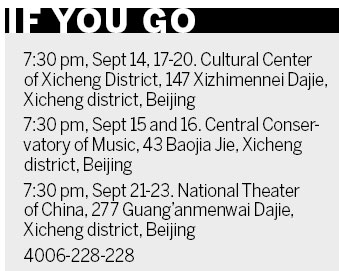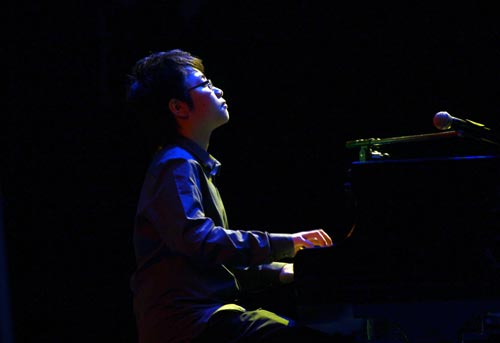Not music for old men
Updated: 2012-09-02 07:58
By Chen Nan (China Daily)
|
|||||||||||
|
Teenage Dai Liang, who prefers playing jazz instead of classical music, will kick off the 7th Beijing Nine Gates International Jazz Music Festival. Zou Hong / China Daily |
Jazz comes to life in the hands of young Chinese musicians at Beijing's international jazz fest. Chen Nan reports.
Dai Liang sits in front of his piano on the stage of Culture Center of Xicheng District in a recent night. After a deep breath, he sends his fingers dancing on the black and white keys. The 13-year-old prodigy, like many kids in China who are learning piano, is intense and skillful.
But instead of playing Beethoven or Mozart, he performs A Night in Tunisia, a popular jazz song by Dizzy Gillespie, with his jazz trio Abu. In black shirt and pants, Dai gets excited at a jam session with the drummer and bassist, playing with dexterity well beyond his years.
"I know I am different from other children, who are learning piano. But that's a good thing - I am special and a unique pianist playing jazz," he says after the show.
The classically trained whiz kid will kick off the 7th Beijing Nine Gates International Jazz Music Festival, which will run from Sept 14 to 23 in three Beijing venues. The youngest performer on the bill will share stages with 20 jazz bands from China and abroad during the festival.
"The music is completely mature and exceptionally developed," says Huang Yong, a veteran bassist who started the festival seven years ago with an aim to promote Chinese original jazz music. "I invited Dai because he proves that jazz exists and popularizes it among young generation. There is hope."
Dai began playing piano at 4. By the time he had his lessons with Zhang Shigu, an overseas Chinese pianist, and within a short time, he could already play a Bach prelude. At 9, he discovered jazz and studied with Kong Hongwei, a veteran Chinese jazz pianist and the founder of jazz band Golden Buddha, one of the pioneering groups that combines Chinese folk music with jazz.
He likes playing free-form tunes for hours after finishing the practices assigned by his teachers. Besides learning the history of classical music, Zhang and Kong also introduced other music genres, which made him also a fan of rock 'n' roll and also Peking Opera. His idol is John Lennon, who inspired him to learn guitar.
According to Dai's father, a jazz fan who usually takes his son to watch live jazz music at Beijing's popular jazz music venues like CD Cafe and East Shore Cafe, the high pressure of the classical music world can be cruel to children and cause young geniuses to burn out. That's why the father is pleased his son has chosen jazz.
"Jazz is flexible and relaxing. There's really no pressure here," says Dai, who just returned from a musical master class in New York during the summer vacation and will study at the middle school affiliated with the Central Conservatory of Music. "Though my main training is still classical music, I spend lots of time playing jazz and searching for the latest information about jazz, because the music genre makes me happy."
Jazz is a fluid genre, and the jazz scene in China is fluid, too. For both the new wave and the veteran artists, faithful entrepreneurs are setting up stages and hoping that the fans will follow.
Huang recalls that in its first year at the Forbidden City Concert Hall, the music festival only lasted for three days with seven bands. While the growth is good, the music festival is still not successful compared with commercial performances, says Huang.
Folk musician Feng Mantian, who will perform in the festival with Golden Buddha, sits with the band on a recent night and plays his zhongruan, a Chinese plucked-string instrument. With a five-minute solo, the 50-year-old paints a musical picture of sunset in Beijing, which is followed by piano, saxophone and drum.
When the surprised audience applauds the combination of the traditional Chinese musical instrument with jazz band, they all continue by playing the renowned jazz song, The Summer Palace, which is one of Golden Buddha's most popular songs.
Feng, who joined Golden Buddha just a month ago, says he was also surprised to find out how the traditional Chinese folk music works with jazz.
"When Golden Buddha found me after watching my shows on the internet, I was so happy and couldn't wait to rehearse with them," says Feng, who has been trying to combine traditional Chinese instruments with other music genres for decades.
"I haven't been so excited for years until I joined the jazz band, which made me feel like I've been reborn," Feng says. "Now I practice at least three hours a day to adapt into the band, just like a newcomer."
"You might think that jazz scene in China is still catering to a minority taste," says Huang. "But when you walk into those jazz clubs, you'll find surprises - those young musicians are playing their original jazz tunes and veteran jazz men like Golden Buddha are still progressing and inventing with new sounds."
Contact the writer at chennan@chinadaily.com.cn.

Today's Top News
Rescuers race against time for quake victims
Telecom workers restore links
Coal mine blast kills 18 in Jilin
Intl scholarship puts China on the map
More bird flu patients discharged
Gold loses sheen, but still a safe bet
US 'turns blind eye to human rights'
Telecom workers restore links
Hot Topics
Lunar probe , China growth forecasts, Emission rules get tougher, China seen through 'colored lens', International board,
Editor's Picks

|

|

|

|

|

|






